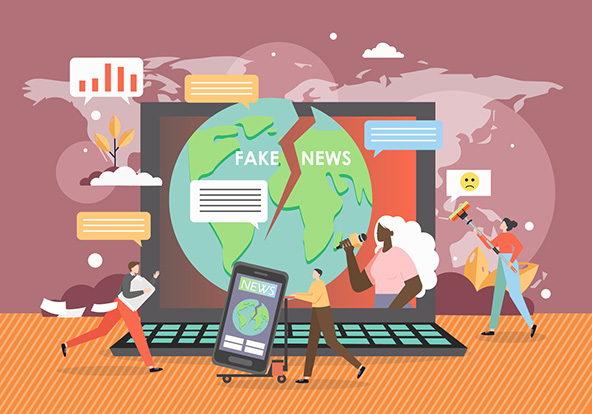
(Illustration by iStock/axel2001)
Consider how you would curate your social media with a critical public audience.
Using social media you can quickly reach a vast amount of people all over the world with ease. When using social media it is critical to share relevant and accurate information with your audience. Your following is primary made up of people with similar interests and ideas therefore, to keep everyone engaged the content needs to be aligned with the community you share. It is crucial that you engage often with your followers and provide value in the content you share. For example; re-sharing content isn’t as engaging to your audience, but adding your own thoughts and ideas to it will attract more conversation.
Identify the risks and benefits of engaging with a public audience in a media space – what are the risks for a public figure or person in a position of trust (educator, lawyer, government official)?
Being a notable person and have a large following on social media exposes individuals to more attention. A notable individual may use social media to connect with others all around the world with similar interests to share idea and get inspiration from in the same media space (Smith). Interaction with people online with similar interests allows you to learn about more interests and gain knowledge first hand from others.
There can be negatives with people of trust engaging with the public online. If the public observes bad behavior or dishonest behavior from the individual, the public on social media will pressure them to make a statement online. Some people have lost jobs, businesses, or even credibility from their behavior in person or online after the public eye shines light on it. This can all be a good or bad thing, it’s good to hold people accountable for their actions or at times the individual can benefit from the attention. However this all being said, it can also be dangerous if public figures who hold trust in the public spread mis-information or outrageously false claims. It is very important that these individuals share accurate information or they could be a danger to the public and lose public trust.
Consider how to best address negative replies and critiques reflective of your personal values and employer social media policy?
Social media profiles can act as a platform to expose one’s brand and one’s strengths (Vance). The best way to respond to negative replies is to be mindful of what you say back, always consider that future employers can view you social media to get an idea of who you are. Remain professional and avoid swearing, be kind, respectful, and use evidence to support you response.
Open dialogues about media literacy and factual information can create conflict, why does this happen?
Media literacy is the constant critical questioning of the media we consume (Smith). Media enables people to learn a lot and discover new information to confirm or support one’s beliefs (Smith). It determines not only how we view ourselves but also it determines how we view others (Smith). This can be negative or positive for the individuals looking for the information to reassure their beliefs. One can find information that supports their ideas/views but, it will be difficult for them to be open minded about opposing ideas or people with opposing views. Media sometimes enables people to pick and choose what information they want to open their minds to. It becomes very hard for people to change their views when there isn’t a motivation to consider opposing information.
What is the benefit of having a PLN that values media literacy?
I believe that a PLN that values media literacy would have more meaningful connection and interaction with a large audience. Having a PLN is meant for discovering new ideas and views while reaching out to a community online. A PLN that values media literacy allows individuals in that community to gain accurate information. There is so much information being consumed on social media which makes individuals have a hard time telling what is true and what is false, which is why media literacy in a PLN is so important (Smith).
References
Smith, Julie. “EDCI 338 – MEDIA LITERACY with JULIE SMITH”. Youtube.Com, 6 June 2021, 3:00-27:40, https://www.youtube.com/watch?v=57r3-aEnci0. Accessed 11 June 2021.
Vance, Jody. “Jody Vance – Media Voices”. Youtube.Com, 6 June 2021, 9:00-27:00 https://www.youtube.com/watch?v=E-NnpQJdl0A. Accessed 11 June 2021.

Leave a Reply